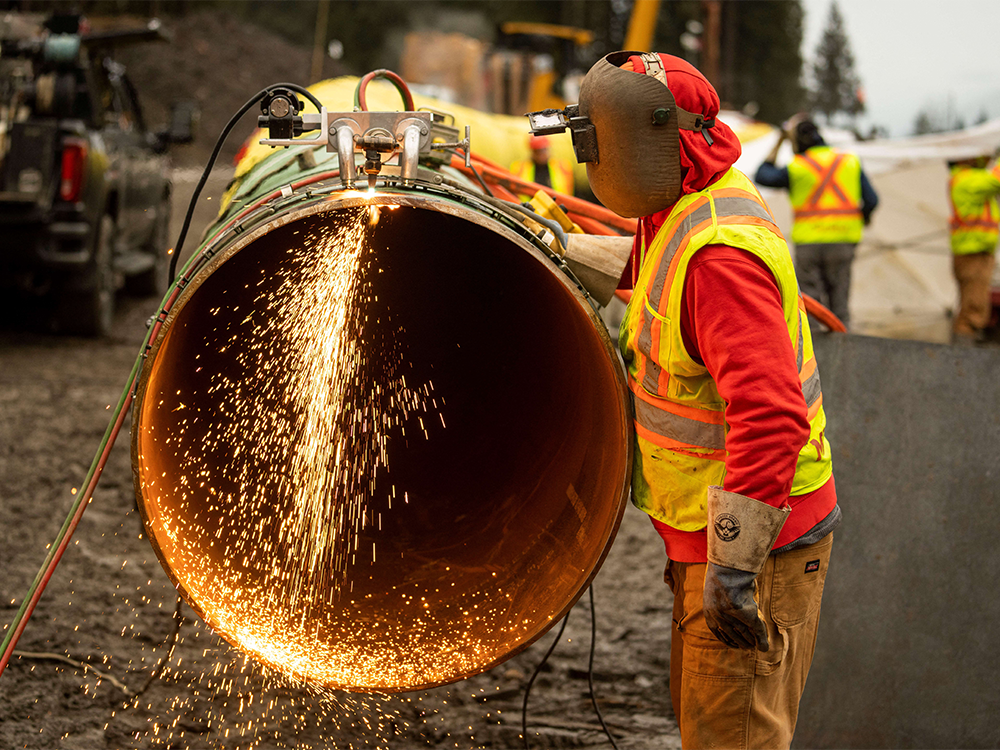
B.C. Premier David Eby continues to say that before the province can discuss the potential for a bitumen pipeline to Prince Rupert, as demanded by Alberta, it needs to ensure the Trans Mountain Pipeline expansion is operating at full capacity.
Experts, however, say that Eby’s excuse for why a new pipeline shouldn’t be built is flimsy as Trans Mountain is already at near capacity, though they acknowledge that building an oil pipeline to Prince Rupert will be costly and time-consuming, and might not be profitable in the long run.
The premier said in appearances on CTV and CBC on Sunday that there is no proponent for a revival of a pipeline project along a similar route as the proposed Northern Gateway project, which was killed in 2016.
He said Ottawa ultimately spent $34 billion to get the Trans Mountain expansion completed after Kinder Morgan backed out, and he doesn’t want the federal government spend billions more on another pipeline.
“Why would we prioritize a massive public spend like that when more limited public spend could deliver additional capacity through the pipeline we already own, and so many projects that are ready to go with actual proponents and able to deliver in a short period of time?” Eby told CTV host Vassy Kapelos.
Jack Mintz, an economist at the University of Calgary, says there are significant costs with building any pipeline and that regulatory challenges such as the ban on tankers off B.C.’s coast are major impediments.
He believes the federal government should focus on easing the path for pipeline projects but neither invest in in them nor buy them outright.
Mintz says there is still research needed on whether Alberta’s bitumen can remain profitable given the $16.5 billion plan to decarbonize the oilsands.
“There may be some profitability for producers to sell decarbonized oil, but if they can get better profits investing in pipelines in the United States or other countries, they may prefer doing that to investing in a pipeline in Canada,” he said.
“From the estimates I’ve seen, oil could be $10 to $15 more expensive per barrel if it has to be subject to carbon capture and storage.”
Mintz said that Eby is wrong about Trans Mountain not being at full capacity and that most pipelines never reach 100 per cent of rated capacity, as that allows allow oil to flow better.
Trans Mountain’s first-quarter report said the pipeline was at 85 per cent capacity at the end of March and plans are being discussed to add lubricants to the pipeline to increase the amount of oil that can flow from Edmonton to Burnaby for export. The company says this could boost capacity by as much as five to 10 per cent within a year to 18 months.
Another idea being studied is to add more pumping stations to the pipeline, which could increase capacity by 250,000 barrels a day. That would take five years.
Energy Minister Adrian Dix has said the province is open to the federal plan to dredge Burrard Inlet to allow ships to load with more oil at the Burnaby terminal.
He increasing the capacity of Trans Mountain would cost between $3 billion and $4 billion, compared to the $50 billion estimated cost of a new pipeline.
“The northern pipeline would require a massive public subsidy. It doesn’t make comparative sense,” said Dix.
“So from our perspective, we want to deal with serious projects, ones with actual proponents and that actually bring the country together. Projects like the work we’re doing to improve the (electricity) intertie between B.C. and Alberta, projects like the North Coast Transmission Line, projects like the natural gas lines that have been part of our priority projects since the beginning of the tariff crisis.”
Mark Jaccard, chair of the B.C. Utilities Commission, said that he doesn’t have a strong opinion about whether or not building a pipeline to Prince Rupert is a good idea but that there is little reason to have this debate until a proponent comes forward.
Where he disagrees with Eby is that such a project would require federal investment.
“I don’t understand how, in a market economy, we need our governments to invest in pipelines. They should be stand-alone profitable investments,” said Jaccard, pointing out that Trans Mountain was a private venture before it ran into trouble and was bought by Ottawa.
He also pointed to research showing that while the proposed benefit of a pipeline to Prince Rupert would be to increase exports to Asia, most forecasters say that it would be very difficult for Canada to move away from the U.S. being the primary market for Alberta oil and gas.
Andy Hira, a political-science professor at Simon Fraser University, said another concern with a pipeline to Prince Rupert is the added emissions that Canada would be producing through exports. He urged Prime Minister Mark Carney and provincial leaders to instead focus on developing clean power sources such as wind, solar and hydro.
He said that, ultimately, the focus should be on making Canada a green energy superpower, which will create economic benefits in the long-run as the transition away from fossil fuels continues.
“It’s understandable that the federal and provincial governments in this time of economic consternation with U.S. pressure on us and the economy seemingly moving toward a recession, reach for this easy solution of building new pipelines,” said Hira.
“However, the Canadian government itself has said that beyond 2030 if we don’t start to reduce emissions we will face annual losses of $35 billion, so you consider those amounts versus the amount of money that would be gained from building pipelines in terms of revenues, and it’s kind of a no brainer.”